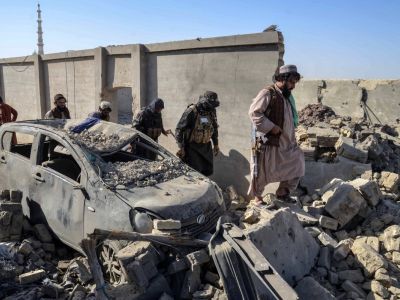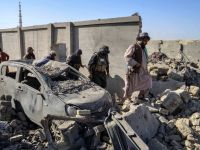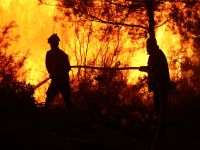The Algerian government, already in a liquidity crisis because of the fall in oil prices, will have to dig deep into the state coffers to finance relief operations after last weekend's deadly storms, according to AFP.
The state budget is already on a knife's edge, with a deficit widened by the recent drop in oil prices and the resulting fall in income from petroleum products, which usually generates 95 percent of Algeria's foreign currency revenue.
This situation will only be aggravated by the state having to pay out considerable sums that it had not budgeted for to compensate the thousands of victims of the storms, said the agency.
Algeria's budget forecasts for 2002 were based on an oil price of $22 per barrel, but the price is currently languishing in the region of $18 per barrel, and analysts believe it will fall even further.
On Nov. 10, Algerian President Abdel-Aziz Bouteflika appealed to the world to extend relief aid for thousands of Algerians made homeless as a result of the flooding.
But, according to AFP, while international aid for the storms is significant, it will not be enough to meet the needs of the victims: 4,000 families lost their homes in the storms that have so far claimed over 700 lives, with some 170 still reported missing.
Add to this the fact that Ramadan - the Muslim month of fasting and prayer - began Friday in Algeria, and the situation is complicated and delicate for the government.
Voices of discontent have already been heard, using the independent press as their mouthpiece to denounce the slowness and inefficiency of rescue operations.
A huge majority of storm victims did not have house insurance, meaning the government cannot count on insurance company pay-outs to finance the reconstruction of destroyed or damaged homes.
Cars - hundreds of which where destroyed in the storms or carried away by torrents of mud and water - were insured, but many Algerians only take out third-party policies, considering fully comprehensive insurance too expensive.
The government has already announced that it plans to allocate 200,000 dinars (about $2,600) to allow families whose homes were not too badly damaged in last weekend's storms to repair them.
But the government also has to repair apartment buildings, roads, and schools. It has to rehouse families and remove some 600,000 tons of mud and rubble with the help of the army.
Algerians fear that the government will once again put the onus of paying for storm relief on the taxpayer, hiking taxes to fill up the state coffers.
Many Algerians still remember the so-called "withdrawals" made on wage packets by the government of Ahmed Ouyahia in the mid to late 1990s. Ten percent was deducted from salaries to pay the wages of tens of thousands of construction workers who had not seen a paycheck in over a year, said the agency.
Algeria's worst natural disaster since winning independence from France in 1962 was in 1981, when an earthquake killed about 1,500 people.
The country is also torn by ethnic strife and a war with Islamic fundamentalists who revolted after being robbed of an election in the early 1990s – Albawaba.com
© 2001 Al Bawaba (www.albawaba.com)









